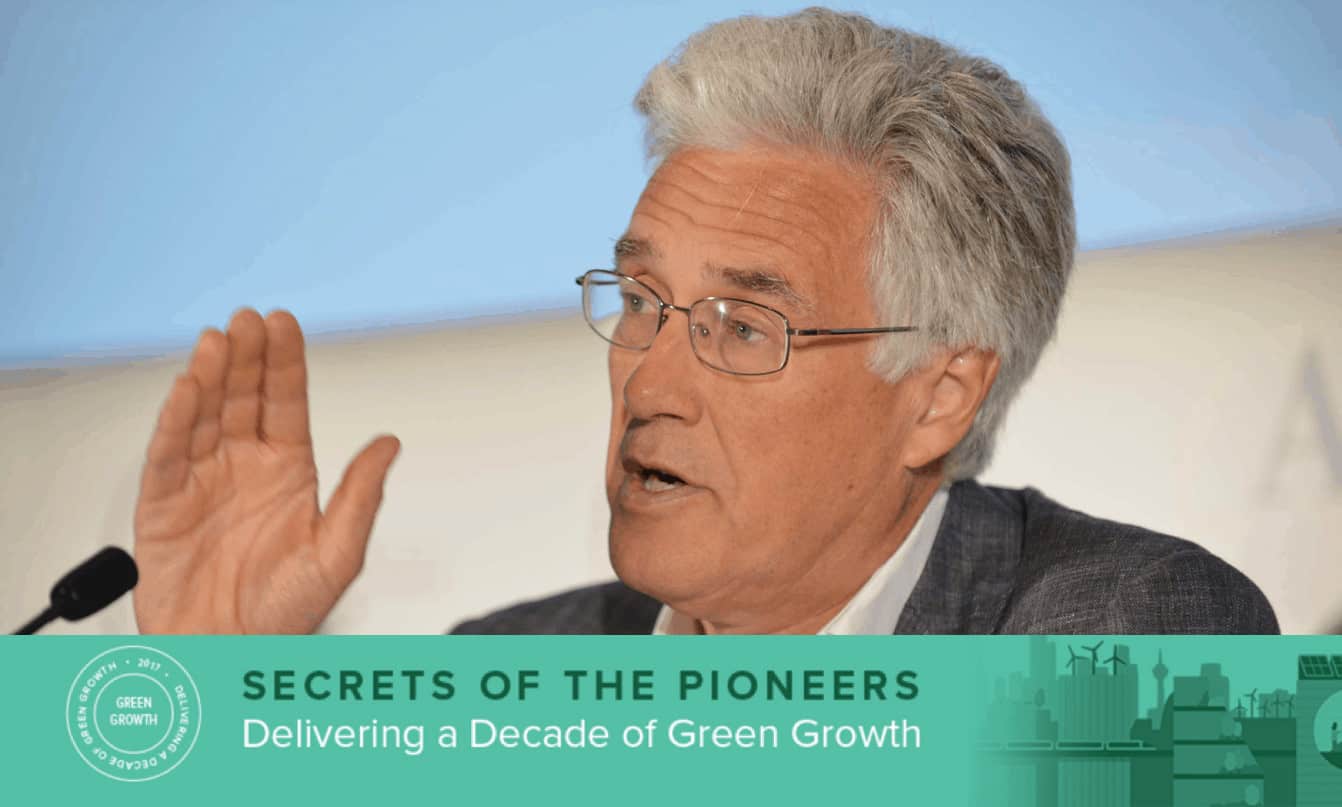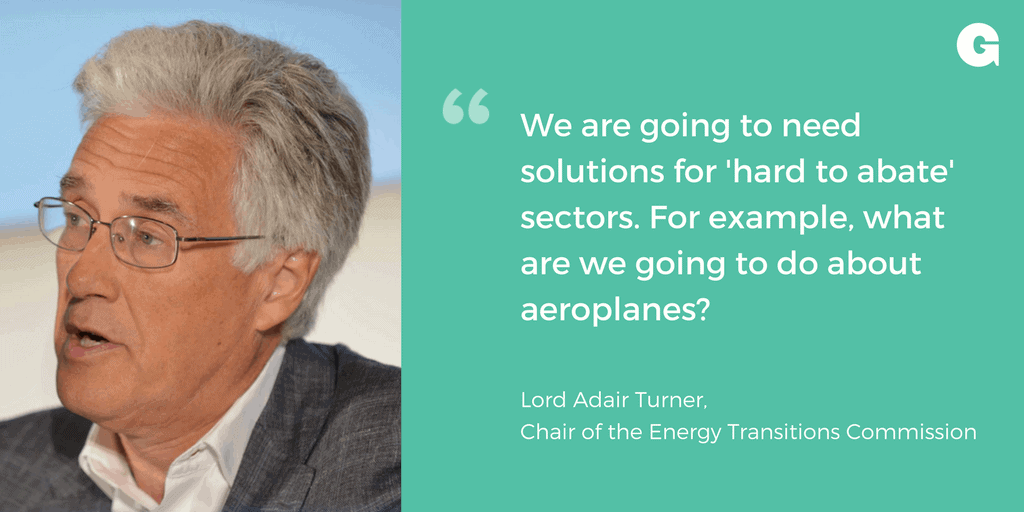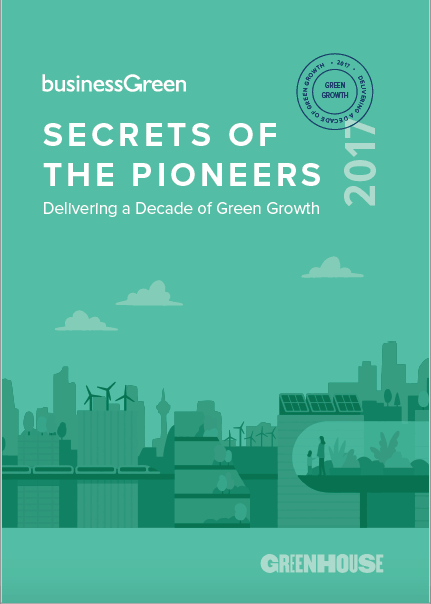Secrets of the Pioneers: Lord Adair Turner

We talk to Lord Adair Turner, chair of the Energy Transitions Commission, which aims to map out pathways for the world to shift to low-carbon energy while still enabling economic development. The interview is part of a series for a report, Secrets of the Pioneers, Delivering a Decade of Green Growth, which will be launched at the BusinessGreen Leaders’ Summit on 9th November 2017.
Lord Turner is a former director-general of the CBI and former head of the Financial Services Authority before its abolition in 2013. He was also the first chairman of the Committee on Climate Change.
Where were you in 2007?
I probably hadn’t thought about the issue of climate change before 1995 or so – I was vaguely aware of the science but I hadn’t really paid a lot of attention to the early development of the Kyoto Protocol and so on.
But when I became responsible for presenting the point of view of business I had to take it seriously. As head of the CBI I had to decide what our lobbying stance would be. So because I had to take it seriously I read and thought about it, and I became absolutely convinced the science was clear, that this was a very dangerous threat, and that there was almost certainly a set of technologies – if we unleashed the power of human innovation, private capital and public support – that could deal with it economically.
In 2007 itself, I have to say I wasn’t heavily and directly involved in a specific climate role at that stage, but I was about to be. I was appointed to the Climate Change Committee (CCC) in early 2008, and we produced our first report at the end of 2008.
Over the last decade how would you characterise the shift you have seen happening in the green economy?
The most fundamental thing that has changed is that progress on renewable electricity has gone far faster than most of us anticipated back in 2007.
If you look at the first work that we did in the CCC in 2008, if you had asked me then what we have to do to decarbonise UK electricity I would have said to back three different technologies: renewables, carbon capture and storage (CCS), and nuclear.
Since then the cost of nuclear has not gone down, the cost of CCS has not come down, and the cost of wind and solar has come down something like 70 and 90 per cent.
So that then raises the real potential that we could actually decarbonise electricity supply with a close to 100 per cent renewable system. The realisation that is possible is one of the most transformational things that has occurred.
What is the most important lesson you have learned over the last decade?
It is that a form of government policy aligned with the free market can work. The fact is, we would never have had dramatic falls in the cost of wind, solar, and batteries without initial subsidies. We made a set of commitments that we wanted green renewable energy – that required subsidies up front to get it going, subsidies which at the time were criticised. Those subsidies, along with public-sponsored R&D support, have driven the private sector to achieve scale and learning such that the prices have come down so much we soon will not need subsidies.
That was the theory of the case that people put forward in advance, but I have to say I think it has succeeded beyond people’s wildest dreams.

What will be the biggest changes from today’s world by 2027?
The single most important answer around the world is that we drive that decarbonisation.
But one also has to realise that’s not a sufficient answer in itself. Because there are some sectors where even if you had limitless green electricity it wouldn’t solve the problem. For example, cement production. It produces CO2 as a by-product of the chemical process.
So we are going to need other solutions for what the Energy Transitions Commission (ETC) calls the “hard to abate” sectors.
For example, what are we going to do about aeroplanes? We may be able to use electricity on some short haul flights but I doubt if we are going to be able to fully electrify long haul flights. What are we going to do about cement production? Steel production?
Which sustainability challenges will be top of the agenda in 2027?
By 2027 we will be increasingly confident that we can build low-carbon electricity systems. We will still have a major challenge however in the fact there is still a whole load of coal-fired power in the world. Because it’s there already it will mean it’s competitive on a marginal cost basis. We will either have the enormous cost penalty of persuading people to close that down before its end of life, or we will have to have CCS.
I think challenge number two will be water. In many parts of the world there are very severe water stress problems which will be made worse by climate change.
Will the world be on course for two degrees in 2027?
I think it is touch-and-go whether we can meet 2C. And although I admire the fact Paris targets 1.5C, as I look at the science that is almost impossible.
We will have a greater confidence we know how to build an eventual zero-carbon economy by the late 21st century, which is fully compatible with rising prosperity in the emerging world. But we will be worried about whether we can get there fast enough to prevent the accumulation of CO2 in the atmosphere getting so high that we go above 2C.
If you could invest in one clean technology through to 2027 which would it be and why?
Even better batteries. What we are seeing so far is remarkable progress with lithium ion batteries, where Tesla and others are operating at such scale they are getting learning effects and economies of scale, and we’re seeing dramatic reductions in the cost of a fundamentally unchanged technology. I think that’s great and it will take us quite far. I think by 2020 we will have battery systems using lithium ion at below $150 per kWh.
But if by 2027 we could get that down to $50 per kWh, and if we could get the density improved to get a kWh per kg of battery, rather than 0.4 kWh per kg of battery, that would be transformational

This interview is one of a series which make up a report, Secrets of the Pioneers: Delivering a Decade of Green Growth, to be published on 9th November, coinciding with the .
We will continue to preview interviews on the Greenhouse PR blog this week. Earlier this week we featured Juliet Davenport, founder of Good Energy, Mark Campanale, founder of Carbon Tracker and Josh Hardie, deputy director-general for policy and campaigns at the CBI. Tomorrow our featured interview is with Kate Wylie, Global Sustainability Director at Mars. The five interviews published last week are still available on the blog.
This year marks the 10th anniversary of both BusinessGreen and Greenhouse PR, the specialist communications agency which supports businesses, entrepreneurs and campaigners working to create a green economy.
At Greenhouse, we support a wide variety of organisations pioneering new standards of sustainability across multiple sectors. Whether it’s fashion, finance or farming, we’re always on the look-out for new opportunities to reach our clients’ target audiences. If you’ve got a great story and need our help to tell it, we’d love to hear from you.


